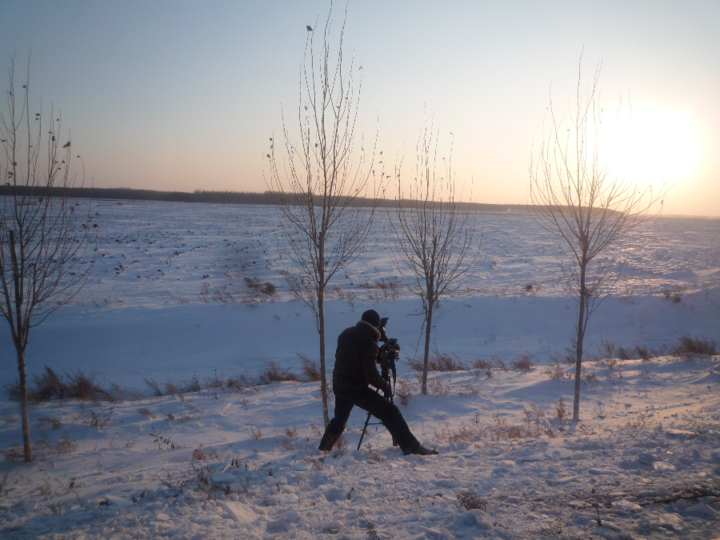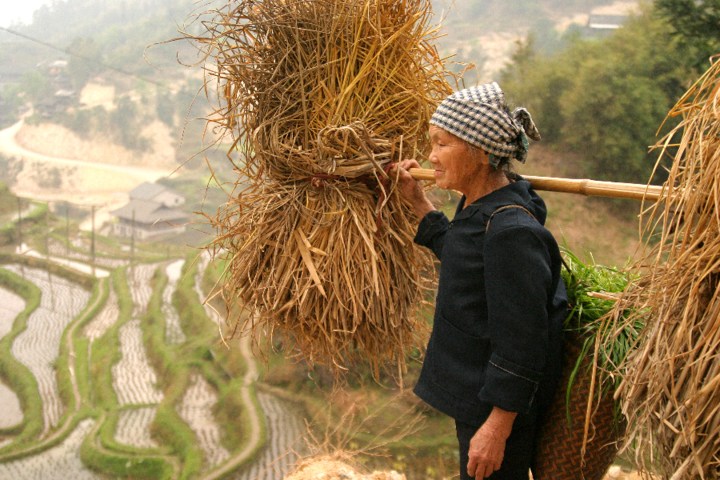We cannot summarize 15 years in China in a few sentences. We cannot summarize the hundreds of trips around all the provinces of the country, the thousands of people that I met there. By sharing with me fragments of their lives, they allowed me to discover the country deeply. I was a journalist and I went to places where tourists don’t go. You have to take some endless roads to measure the immensity of China. This kind of delicious vertigo is often absent with plane or train trip. You have to walk under the sky to feel its climates. Shopping malls and air-conditioned hotels numb our senses.
I remember the dry, blue cold of Heilongjiang winter -- the painful bite of the sharp wind on my eyes filled with tears, nose that freezes, lips covered with frost. Then the comfort of a terracotta kang [warm bed widely seen in rural areas in northeast China], which warm the body back to life. The air in the house where a modest family who hosted me that night is saturated with delicious smells of hot cabbage and pork broth and charcoal which ensures real comfort. Here, the gloomy farmers, gnarled like old trees, quickly become kind, laughing comrades, after a few swigs of Erguotou, a 56° sorghum alcohol.

Photo shows Sylvain Dulac in Heilongjiang Province, NE China in 2010.
Even further north, I was going to film a town where live the Hezhe people, a small ethnic group in northeast China. These former nomadic hunters and fishermen are now settled by the Songhua River. They hardly make their famous fish skin clothes anymore. Temperatures here drop to -40°C. An old patriarch insists on taking me across the thick blanket of snow to the frozen river. Despite his visible illness, armed with ancient tools, he sets out to break through the thick layer of ice. He dips his line into it to catch the fatty fish that we cook over a wood fire. Like a journey into the past: the old man takes me by hand, opens a window into his youth, from where I see an era that has forever disappeared. He seems happy. It is me, paradoxically, who is melancholy.
From shivering white, I pass to azure blue, summer green and overheated ocher. The Taklamakan Desert extends in all directions, up to the foothills of the Himalayas. The vast area of Xinjiang Uygur Autonomous Region has opened its ocean of sand to highways and their myriads of trucks coming and going, fueling economic activity that is more intense every day. Coming here, to the Chinese far-west, is already a bit like being in Central Asia. I come across a few Uygurs, Tajiks, Kazakhs, their superb traditional headdresses, their weathered faces and their inscrutable looks. I walk for days, without ever finding the way to the ancient Silk Road. I would like to go further, but I gave up: certain mountains are impassable.
And then there is Xizang. Another planet. Through the car window, at an altitude of 4,000 meters, for endless hours, landscapes worthy of science-fiction films parade jumping into my eyes. This nature seems out of reach, ethereal, unreal. At the slightest opportunity, I get out of the vehicle and walk. I tell myself that to deserve all this beauty, you have to suffer in your flesh from the crushing gravity, the lack of oxygen, the penetrating cold of the high-altitude winds. Caught between heaven and earth, on these high plateaus shrouded in supernatural lights, I see some rare animals, but very few men. How to live in such an environment? In this mineral kingdom, life is not welcome. Yet I feel an almost permanent aesthetic emotion. How can we prove ourselves worthy of this splendor which is thus offered to us?
Further south, this Yunnan province has it all: generous nature and wonderful inhabitants. I remember these old ladies from the Hani minority, near the border with Myanmar, who went into the lush forest to glean mushrooms and wild herbs. They wore their traditional multicolored clothes and headdresses, and smiled and laughed like children playing a game.

Photo taken by Sylvain Dulac in 2012 shows a woman in the rural areas of China's Yunnan Province.
I could fill volumes with these anecdotes. I loved my life meeting rural Chinese.
I was never very enthusiastic about living in big cities, which is, in my opinion, not very different from one or another country in the world. So, at the slightest opportunity, I went back far away: the further I got from the cities, the more I met authentic people, inhabitants of great patience, of a strength of character which meanwhile matched by their softness. I made selfless friendships. I admired their capacity of collective work, their common sense, their detachment, their simplicity. I observed them using their unique skills, inherited from generations of artisans. They lived in landscapes often worthy of movie sets. Deep down, I hoped that the overwhelming global economic model, which often distorted the soul of city dwellers, would not come to contaminate these lives and these corners of paradise that you, readers, may perhaps be able to discover. But for that, you will have to... travel far!
Sylvain Dulac is a French man living in China for 15 years.
Planner : Jie Wenjin
Reviewers : Hou Weili and Cheng Li
